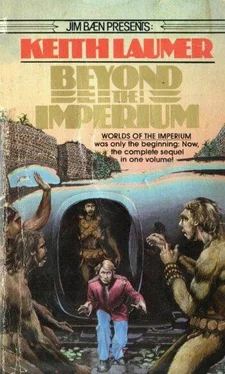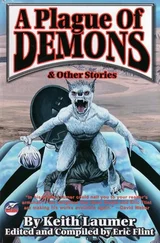“I’m sorry; she was a shadow in a twilight world. And you, I’m afraid, were caught up in her spell. I did what I had to do. I would have brought her with us, but it was impossible. The fabric I’m weaving is too fragile at this stage to support the transfer of a key figure from a peripheral A-line.”
“I don’t know what you’re doing, Roosevelt,” I said. “But whatever it is, the price is too high.”
“One day you’ll understand, Curlon. Of all mankind you’ll understand best. Because, out of all the millions of pawns on the board, you alone are my compeer; like mine, your destiny is entwined with that of the new world that’s taking shape.”
“Count me out, General,” I said. “I want no part of your operations. If you’ll tell me where my pants are, I’ll be going now.”
Roosevelt shook his head, smiling a little. “Curlon, don’t talk like a fool. Do you have any idea where you are?”
I got out of the bed, shakily, and went to the window and looked down on lawns and flowerbeds that were almost familiar.
“This is a world-line far removed from the turmoil of the Blight,” Roosevelt said as I dressed in the loose shirt and tight pants laid out for me. “Its common-history date with your world is 1199 A.D. We’re in the city of Londres, capital of the province of New Normandy, an autonomous duchy under the French king, Louis Augustus. Great affairs are afoot here, Curlon. Rebels challenge the power of the Emperor, loyalists are charged with treason, and across the Channel, Louis waits, ready to land forces at Harwich and Dover and Newcastle if needed. A touch would send the situation crashing into war. It’s that which we must prevent.”
“And what’s in it for you, General?”
“I’m known here; I enjoy the confidence of both Victory Garonne and important members of the rebellious faction. My hope is to prevent bloodshed, stabilize the situation. A strongly established A-line is necessary to contain the vast energies I’ve channeled here. You’ll recall what I told you of key objects, key lines. New Normandy will become the key line of its probability quantum, with the aid of the artifact we brought here. And with the rise of the new master-line, our stars too will ascend!”
“And where do I come in?”
“Ten days ago, Duke Richard fell dead at a public ceremony in full view of the populace. Murdered, they say. The rebels charge the loyalists with eliminating the natural leader of the Britons; the loyalists in turn charge the rebels with killing a man they regarded as no more than a vassal of the French king. The tension has reached crisis level; it must be relieved.”
“I still haven’t heard anything illuminating.”
“It’s really quite obvious,” Roosevelt said. “As a Plantagenet born and bred, you’ll step forward to take up the role of the Duke of Londres.”
“You’re out of your mind, General,” I told him.
“Nothing could be simpler,” he said with a wave of the hand. “No one could deny that you look the part; you’re enough like the departed Duke to be his brother. However, we shall present you in the role of a more distant relation, raised secretly north of the Scots border. Your appearance will satisfy the most fanatical rebel, and of course you’ll make suitably defiant pronouncements to satisfy that clique. More discreetly, you’ll engage in dialogues with Viceroy Garonne aimed at easing the crisis and restoring civil order.”
“What’s going to make me do all this?”
“This is the drama of life itself—and you were a part of it from the moment you were born—and before. Like me, you’re the inheritor of a mighty dynasty. All that you might have been—that your analogs, those close to you might have done—all the vast repercussions across time and history of every act of that great clan, chopped down in the prime of their strength—all those aborted probability energies must find their expression in you—and in the world you help create!”
“What about my own world?”
“The new master-line will dominate the quantum,” Roosevelt said flatly. “In the readjustment that accompanies its establishment, lesser lines must of necessity be sacrificed. The Imperium and the Blight Insular lines will go under. But that’s a matter of no moment to you, Mr. Curlon—or to me. Our destinies lie elsewhere.”
“You have it all figured out,” I said. “There’s just one weak point.”
“Which is?”
“I won’t play.”
Roosevelt looked grim. “Understand me, Curlon: I want you as my willing ally; but willing or not, you’ll help me.”
“You’re bluffing, Roosevelt. You need a walking, talking puppet, not a man with wires on his wrists.”
He made an impatient gesture. “I told you I regretted that, and the need for drugging you to bring you here. But I’d do it again, ten thousand times, if that were the only way! The Old Empire will rise again! We’re not discussing if, Curlon; only how. Meet this challenge—lend me your full support—and your future will be of a splendor unimaginable to you now. Defy me, and you’ll walk like a corpse through what would have been your triumph. Which do you want, Curlon? Honors, or rotted^rags? Majesty, or misery?”
“You’ve worked your story out pretty carefully, General. But it still doesn’t make sense.”
“The rebels are strong,” Roosevelt said grudgingly. “They have all the strength on their side, if the truth were known. They could seize power any time they chose. They lack only one thing: leadership. They’ll rally to you, Curlon—but instead of leading them to victory, you’ll cool their revolutionary fervor. Because if they should rise up and cast out the French, a major branching of the line will result! Seven hundred years of stable history would be shattered, creating a whole new probability spectrum. I need not detail the effect this would have on my plans for New Normandy!”
I smiled a smile I didn’t feel. “You’re in trouble, aren’t you, Roosevelt? You need me—and not just to carry a spear in the third act of some farce to fool the locals. What is it? What’s the real reason for trying to drag me into this paranoid fantasy-system of yours?”
“I’ve told you! We’re linked, you and I, all down through the corridors of past time, on every world within a thousand years of common history. As your fortunes wax, so do mine. I can force you, Curlon—but to the extent that I must break you to my will our joint stature is diminished. Join with me freely, lend your mana to mine—and anything we desire is within our grasp!”
“And if I don’t?”
“I want your willing aid,” he said in a steely voice. “But your broken mind and body, dangling from the strings, will serve if need be.”
“Everything you say confirms the one clear idea I’ve gotten from all this, Roosevelt. Whatever this fight is, you’re on one side, and I’m on the other.”
“I can break you, Curlon. The stronger man can always break the weaker. A simple demonstration will suffice to prove my point.” He took a stance with his feet apart and raised his arms until they were level with his shoulders, smiling.
“The first to drop his arms acknowledges the other man his superior—at least in one small way.”
I put my arms out. The effort made my temples pound, but I didn’t burst into tears. If Roosevelt wanted to play little games I was willing to go along. The hamburger machines could wait.
“In every world, in every time, the will of some man has shaped reality,” Roosevelt said suddenly. “Here, now, that old rule is still in force—but made more potent by the existence of titanic new forces. Those forces are at the command of whoever can master them. Fate is a fragile thing, Curlon. A mindless thing, controlled by the whim of a strong man. Let an Alexander set out to conquer the world; the world becomes what he makes it. Without Alexander, there would have been no Caesar, no Atilla, no Muhammad, no Hitler in your world, no Guglielmo Maxoni in the Zero-zero line. Men make fate, Curlon, not the other way around. You saw that demonstrated when we fought together, back to back. We two form islands of stability about ourselves, even in a sea of formlessness.
Читать дальше












